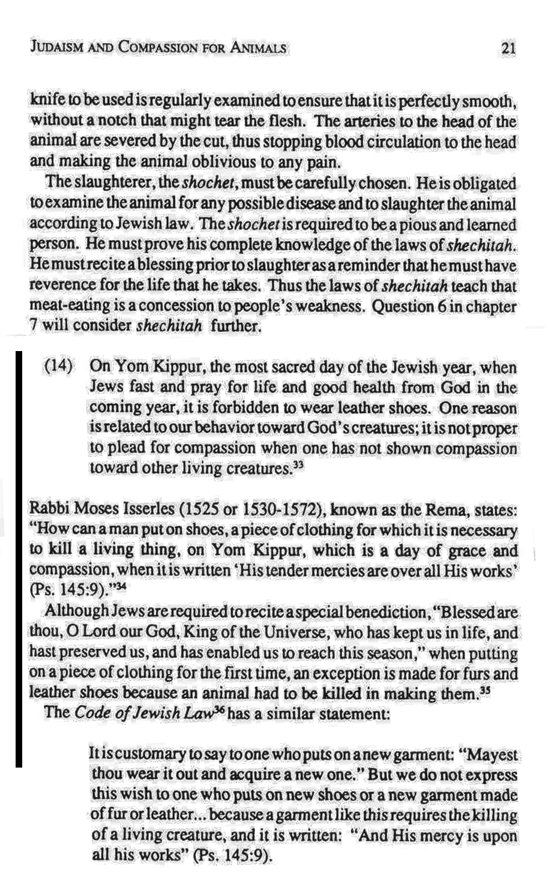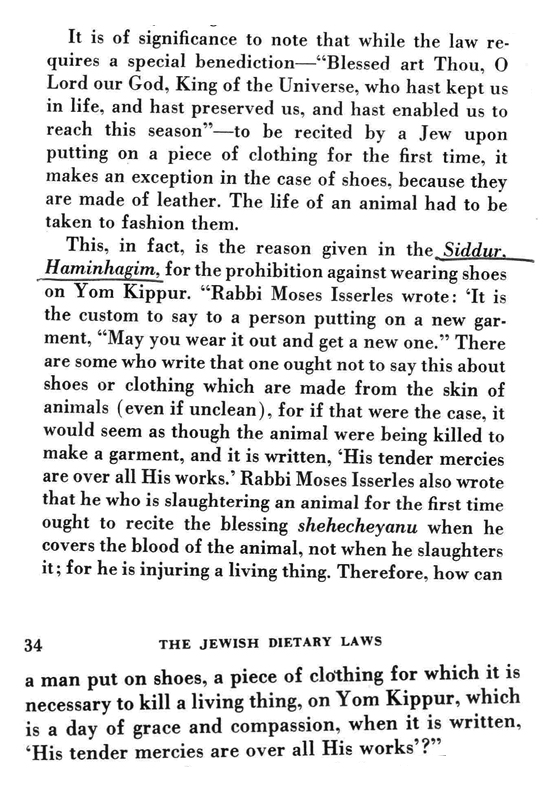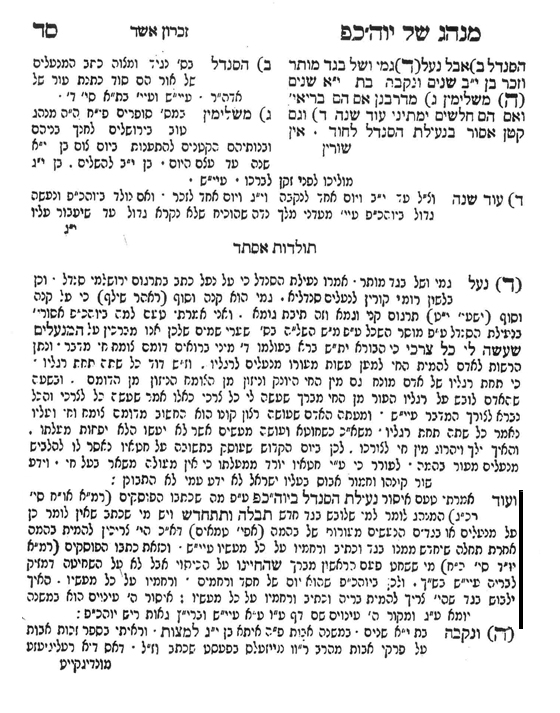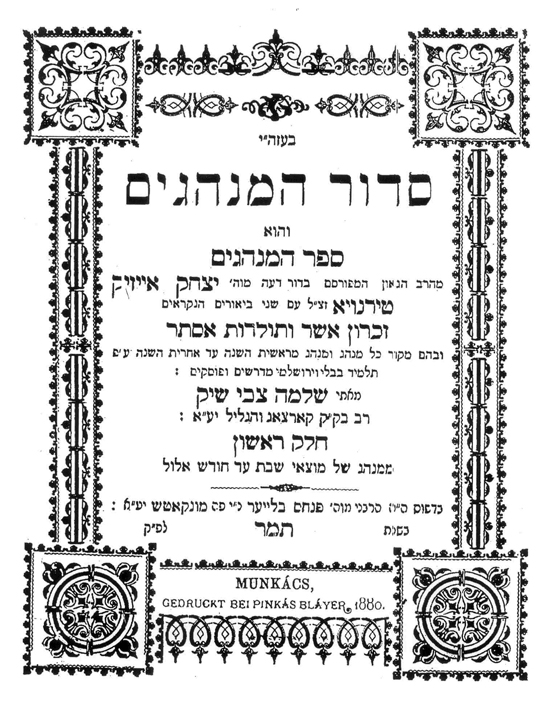A Quotation Fabrication: What the Rema did Not Say on Wearing Leather Shoes on Yom Kippur
The PETA website (accessed Aug 2, 2011) states:
“Jews are prohibited from wearing leather on Yom Kippur.”
“Jewish Vegetarians of North America President Richard H. Schwartz explains “One reason is that it is not considered proper to plead for compassion when one has not shown compassion to the creatures of G-d, whose concern extends to all of His creatures.” (see his website)
“Many rabbis through the ages have shared this view. Rabbi Moses Isserles (c. 1528-1572), aka the Rema, said, “How can a man put on shoes, a piece of clothing for which it is necessary to kill a living thing, on Yom Kippur, which is a day of grace and compassion, when it is written ‘His tender mercies are over all His works’?” (Psalms 145:9).”
I came across this while researching my Fall 2011 Jewish Action column on the misconception that it is prohibited to wear leather items, such as a leather belt or yarmulke, on Yom Kippur and Tisha B’av (see here). Actually, as I show in that article, there is no general prohibition against wearing leather on Yom Kippur. Furthermore, there is not even a prohibition of wearing “leather shoes.” Rather, the prohibition on Yom Kippur and Tisha b’Av is wearing “shoes”, which in normative halacha are defined as leather shoes, although not everyone agrees to that and many authorities assume the prohibition is to wear any protective shoe.[1] Thus, not wearing leather shoes has nothing to do with compassion to animals, but is rather an innui for us, not compassion for animals. In addition, these rules also apply on Tisha B’av when there is no “pleading for compassion” and when we also wear leather at Mincha – when we put on tefillin.
But most intriguing was this “quote” from the Rema that PETA cited from Richard H. Schwartz. It did not sound like the Rema, and indeed it does not exist. So I proceeded to track down its origin. (It seemed unlikely that Richard Schwartz would simply fabricate a quote.) The Rema (OC 223:6, cf KSA 59:13) does quote that verse, but in a different context. He records that it is customary that when someone acquires a new garment people wish him well by saying “tivale v’tichadash – may you wear it out and get a new one”, however some people say not to say that on leather garments because then another animal will need to be killed and God is merciful on all his creatures. Amazingly, the Rema then rejects that argument as weak. Thus, in the only place where the Rema cites that pasuk he rejects it as a reason.
So where did PETA find this “quote”? In Schwartz’s book Judaism and Vegetarianism (p. 21 in the 1988 ed.) he includes this –

– and in footnote 34 he tells us that his source for this amazing quote is Samuel Dresner, The Jewish Dietary Laws (p. 33-34, 1966 ed). Unfortunately, Schwartz misread Dresner, misunderstood where quotes ended, did not look up Dresner’s source, and thereby fabricated a quote from the Rema.
Dresner’s point of departure was the law cited above regarding the good wishes offered upon putting on a new garment. He then cites a novel reason for the prohibition of leather shoes, but does not give much detail about his source. It turns out that this reason is found for the first time in Toldot Esther, a commentary by Rabbi Shlomo Tzvi Shück (1844-1916) on the Siddur haMinhagim of Rabbi Yitzchak Isaac Tirna (64a in the 1880 ed. link).
Dresner may or may not have understood where the quotes end, but it is indeed confusing in his English rendition.

He quotes the Rema regarding leather clothing along with the pasuk from Tehillim (and following Shick, leaves out the Rema’s rejection). He then quotes the Rema regarding no shechiyanu on shechita and, without opening or closing quotes, proceeds into Shick’s novel reason for not wearing leather shoes on Yom Kippur.
Rav Shick (see scan below) was very clear in how he explained himself. He wrote that he had his way of explaining the prohibition of wearing (leather) shoes on Yom Kippur. He then cited the Rema on new clothes and the Rema on shehechiyanu on a first occasion, and based on those asked rhetorically how on Yom Kippur which is a day of chesed v’rachamim one can wear a garment that necessitated killing an animal. He had no fabricated quotes, but he does offer a perplexing explanation for something that was not looking for one. As noted above, the prohibition on Yom Kippur is to wear shoes, which some people understand to mean leather shoes. But the prohibition is derived from the fact that going shoeless is an innui. It also therefore applies on Tisha b’Av and to mourners, obviously unrelated to chesed v’rachamim. Furthermore, leather may be worn on Yom Kippur.


Thus, a novel, difficult to understand explanation for a straightforward prohibition has spawned a fabricated quote from the Rema that is now fairly widespread on the web.